3 Experts Debate SEO Best Practices For Publishers In 2019
Recently, we had a chance to bring together 3 leading experts that are actively working in the field of SEO for major publishing brands. These experts debated the most popular topics in SEO as a part of a panel hosted at Pubtelligence. Pubtelligence is a digital publishing event hosted at Google offices that features hundreds of the world’s top publishers and media brands. In this panel, the 3 experts tried to better define what SEO best practices looked like for publishers in 2019.
The panel on SEO was hosted by Head of Marketing at Ezoic, Tyler Bishop, and consisted of the following SEO experts:
Richard Nazarewicz is the head of SEO at the Wall Street Journal. Originally from England, he moved to New Jersey six years ago. For two years, Richard has headed up the technical SEO team for WSJ and helps drive strategy for SEO across the organization.
Lariza Quintero is the SEO Manager of Complex Networks. She first worked in cybersecurity but eventually fell in love with digital marketing, which led her to SEO. Lariza began with e-commerce and publication clients but now works in-house at Complex Media. As SEO manager, she oversees the main Complex site and the First We Feast publication, amongst all other publications under the Complex umbrella.
Carolyn Shelby is the head of SEO at ESPN. She began working in the industry in 1994 when she helped co-found an internet service provider. She built her first web site in January 1995. As someone who is competitive, she began working with SEO in order to rank number one. She joined the publication in October 2018.
You can watch the full panel discussion in this video or read the questions and summaries of the expert answers below.
What are SEO best practices and how are they changing?
Below are summarized answers from our SEO experts. Questions came from our moderator or the audience. The audience was composed of roughly 200 digital publishers ranging in size from independent bloggers to major media brands.
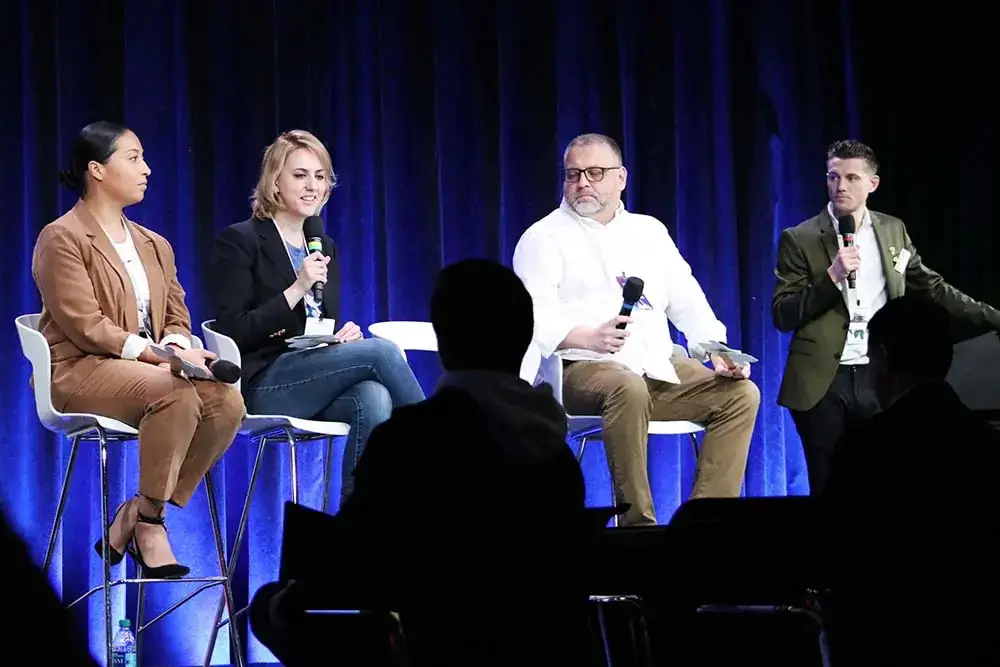
What is the worst SEO advice you’ve ever witnessed?
Richard: The worst advice I’ve witnessed is any time someone promotes “I can ensure your page can rank number one!” People are still promoting that activity. Also, the other bad advice I’ve seen is to stuff as many keywords as you can into your content, especially in white text or hiding it in JavaScript.
Carolyn: Some of the things I’ve seen lately is that people are still buying links, submitting their sites to meaningless directories all over the place, and advice to no-index pages on their site. I think this ties into that ‘pruning’ that everyone’s into now but it’s really bad for your site.
Lariza: This may not be the worst I’ve heard but it’s one that has really stayed throughout my career, and that is to just optimize your site just for Google. Yes, Google it’s Google, and for most of us that’s where the majority of our organic traffic does come from.
However, I’ve seen cases where clients thought the majority of their traffic came from Google when actually most of their traffic came from Bing. I think really being aware of where your audience is coming from, what devices they’re using, what search engines they’re using, and aggregators are extremely important.
Can sites rank with bad links, content, site speed, crawlability, and “E-A-T”?

Richard: I stand by good content. If a site’s template isn’t optimized well but the content is really great, that good content will always appear on the surface.
Carolyn: I think there are going to be exceptions to every rule. I don’t think any site with universally bad links or content is going to be able to rank. When they say it can rank, does that mean just the homepage?
There’s a lot of things that go into rank. If you are truly the most relevant answer for a given query, you’re going to show up as number one. But, is it the query that you want to show up for? It always depends.
Lariza: I’ve run into searches on my own where I landed on a page and the content wasn’t really reflecting what I was searching for. As an SEO professional, I automatically question how that content got there. I do think they’re doing something well that is contributing to the ‘whole,’ so I definitely agree.
Which is better for SEO: subdomains or subfolders?

Tyler: Google says it doesn’t matter, but there seems to be a lot of debate about this. What are everyone’s thoughts?
Carolyn: I don’t understand why this is even a debate. A subdomain is treated like a separate website, and a subfolder is part of the same website–period, end of story. The only time your client gets to insist on a subdomain is when there’s a technical reason why they cannot make it a subfolder. If you have a blog, you’re going to benefit by having it in a subfolder more than a subdomain.
Lariza: I definitely agree — you should keep everything in the same ecosystem. I have seen where your shop does live outside of your main domain, but other than that, I think everything should be kept in the same ecosystem.
Richard: I completely agree with you, but we do have a situation where we have conferencing and other marketing sites that aren’t anything to do with the actual publication itself. We use the subfolder strategy for the content we need to surface it on wsj.com, such as ‘/pro’ for our pro services.
Is SEO dead or are services and the need for pros continuing to grow?

Lariza: I definitely think it’s going to continue to grow. There are so many articles out there that say ‘SEO is dead,’ but I don’t think it’s going anywhere, especially for pioneers who have been around for awhile. They have seen the rapid changes throughout the years, so I think as technology continues to evolve, the importance of SEO should really be emphasized in companies.
I’ve been on the agency side, where the SEO team was really small compared to paid search, and it is at Complex as well. I would like to see SEO teams be bigger in companies and agencies, but I don’t think it’s going anywhere.
Carolyn: I’ve found that jobs explicitly labeled ‘SEO’ are actually going down, not growing, and they’re they’re renaming them as ‘Audience Growth’ and ‘Audience and Engagement.’ The types of jobs that require SEO knowledge and a grasp of the concepts are growing, however.
At ESPN, we expect everyone to have some SEO awareness, including our writers, marketers, developers. Our marketing team should also understand what SEO can do, what it can’t do, and how to manipulate the message to make it work for whatever we need it to.
I don’t know that the SEO strategist type of jobs is going to grow indefinitely; I imagine they’re going to plateau and maybe taper off a little. But I think knowing SEO and having the ability to initiate some change in that is going to be something that every job, or at least a lot of jobs, are going to have to start absorbing and making a part of the core requirements.

Richard: I think in the future it will stabilize but it’s currently growing. There should be an SEO team with strategists, technical SEOs, and content packaging, but also SEO as a culture needs to be a part of the DNA the whole company. WSJ is doing that really well right now by getting buy-in from all sides of management.
In the last 10 years, there was a big push towards social and everyone moved onto the social bandwagon, but I think people are now coming back people as they realize SEO is important again. SEO jobs are growing —they definitely are for us —and if anyone wants to come and talk to me after this, I’m more than happy to talk to you about it because we definitely have openings.
Basic SEO vs. dwell time, CTR, and new theories

Tyler: How important are the basics of SEO vs. looking at these sorts of debated metrics?
Richard: I think the basics are key. When I started at the Wall Street Journal, I looked at the ‘bricks and mortar and the foundation’ of what was going on. We’re still doing it now — we’re still auditing weekly to find issues.
You have to know the basics and you have to cover your bases to make sure that you have good pagespeed, find broken links, and everything that’s to do with technical SEO. Then, the other stuff can be looked at.
Carolyn: There are certain types of queries where dwell time is going to make a difference but there are other types of queries where it’s not going to make a difference. So, to say that universally you would need to worry about that, I think is incorrect. I think there are certain industries, certain types of queries, where you do want to keep the user on the page.
If you’re making money with ads anyway, you’re already concerned with how long users spend on your page because you want to know how many ads you can push at them. So, I don’t think it’s going to be a big deal for everyone; I think it’s always been a big deal for certain types of queries. I wouldn’t hyperventilate over it.

One of the slides I used to use in my basic training was a slide of a cake. I would describe how SEO is like the sugar of the cake —if you skip adding the sugar to the cake, you’re still going to have a cake at the end of the process, but it’s gonna taste bad.
So, you do need to stick to the basics, because I think people have a tendency to forget the underlying cake and focus on the frosting. You don’t want frost on styrofoam, that’s nasty.
Lariza: That whole Reddit thread (AMA feat. Gary Illyes) was really intense. I do think it is simple, but it’s easier said than done. Crawlability and creating content that people are searching for are both super important, and then you have other metrics that are on other platforms that you also can rely on. But, I think the basics are easy —once again it’s easier said than done —but I do think we have to stick to the basics, for crawlability at least.
Do you trust Google’s advice about SEO best practices?
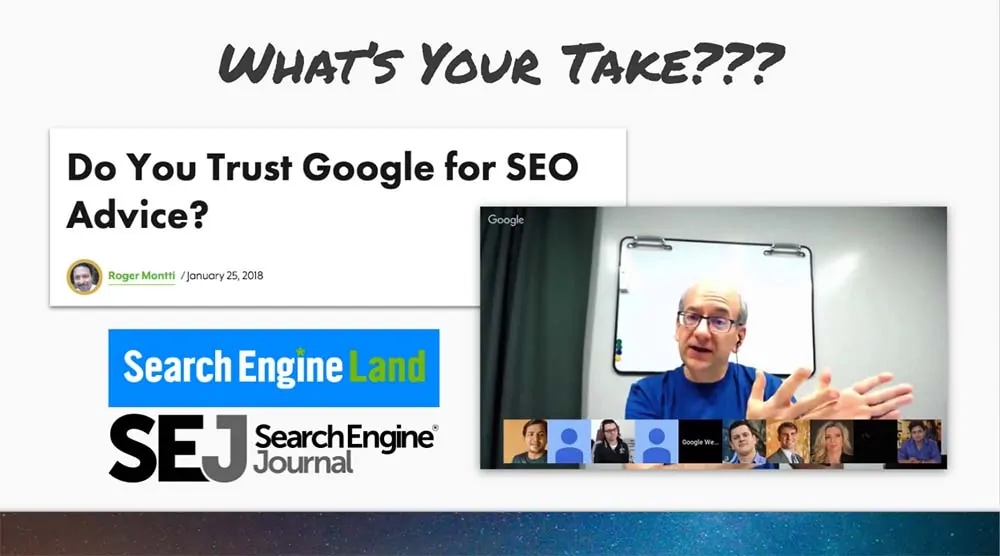
Carolyn: I find Google’s always speaking in a Clintonian kind of way —they’re very specific when they say certain things, and we don’t always necessarily know what the technical definition of what they’re saying is, so we start making guesses and extrapolations.
You have to parse literally every word that comes out of their mouth and make sure that you understand specifically what it is they’re talking about. It’s not likely not to be a broad recommendation; it’s something that specifically addresses the question that was asked, and it probably only applies to that question.
So do I trust what they say when I completely understand what question they’re answering? Yes. But they’re not out to help us game the system.
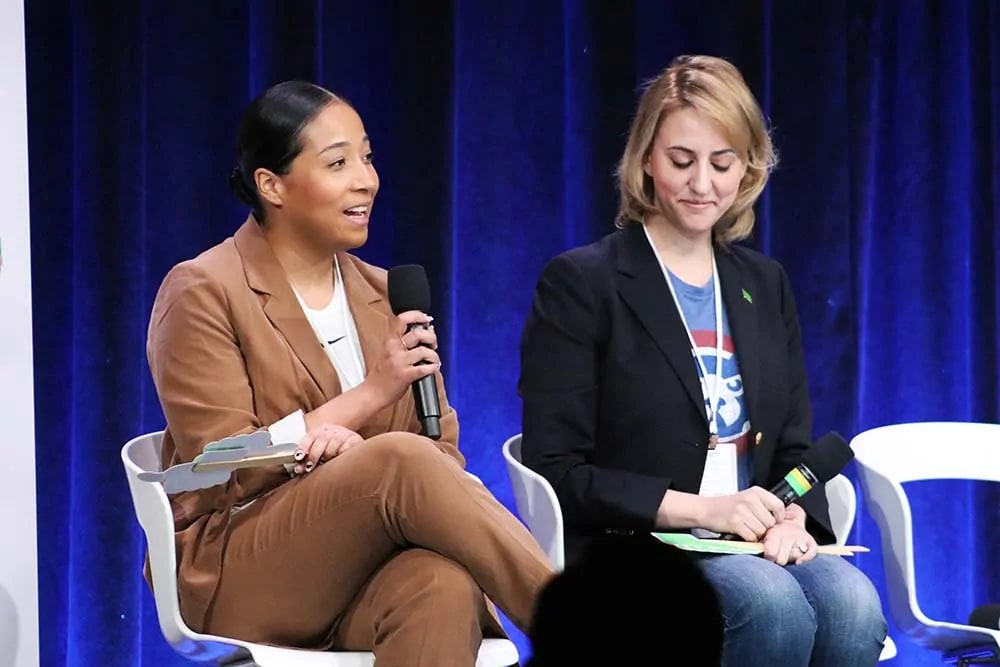
Lariza: I have to say yes, you have to trust them to an extent. I know we are in the Google house, but a lot of things are contradicting at times; one day they could say one thing and the next day it could seem like something else is important.
I’m also one to follow a lot of other industry leaders with SEO advice, so I think you still need to trust Google’s SEO best practices to some extent.
Richard: You should take on board what they announce and what they publish when they publish it… if they publish it. They published a core update yesterday and they offered nonspecific help on it.
I am on Twitter every day to watch what’s going on, and checking Google’s accounts, so we have definitely listened to stuff and taken stuff on board internally. But, there’s a lot of flux; you may be told one thing today and it turns out a few months later something else is actually happening. You have to watch it and see whether that’s actually going to come to fruition or if it is going to morph into something else.
How is SEO different or similar for large brands or sites?
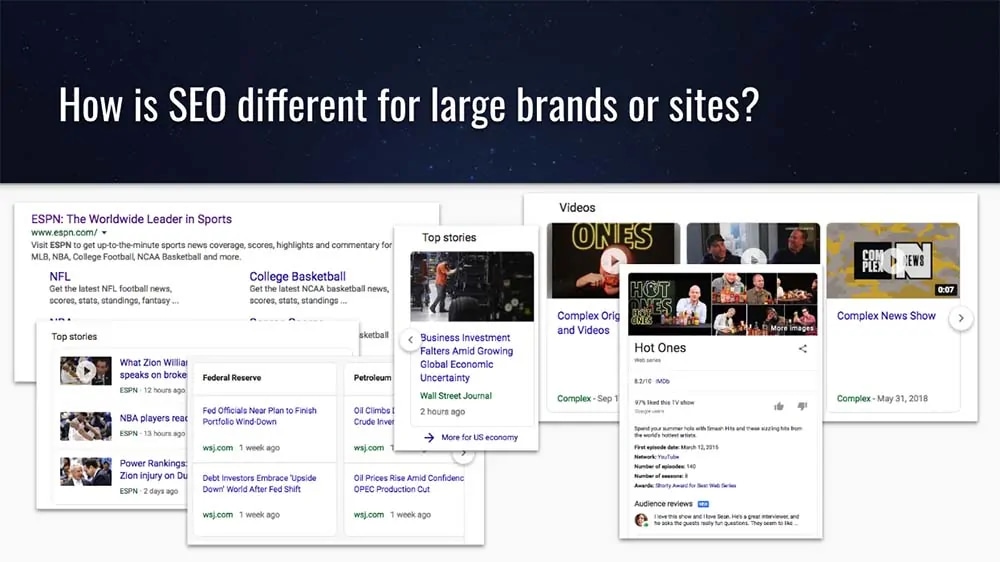
Richard: I’ve worked on small sites, tiny sites, medium sites, and now the current site I work on is enormous, with several different sections and parts. Because we have these conferencing sites that are WordPress-based, I still get my hands dirty with about 30+ sites that are WordPress sites; we use Yoast SEMrush, Screaming Frog, just like a lot of smaller sites. But, we also need to use bigger tools because we have so much content.
There’s a lot more technology involved. There’s OJS, new languages, infrastructures that you may not have worked with before, you have to know AWS and how that works, you have to know how Google Cloud works, etc.
Another thing is that because of our indexability, we can make some very small changes and that has quite a big impact very quickly, whereas a smaller site might take a little longer to see changes.
Carolyn: The basics and fundamentals of SEO best practices are the same regardless of whether you’re on a small site or a large site; you have to ask yourself, is your page crawlable? Is the content good? Is the underlying structure sound? How are your internal links? How’s your navigation? All of those things are the same as smaller sites, but we’re just doing it at a much larger scale.

The nice thing is when you’re on a centralized platform is if there’s a structural change that you make, you can deploy it out across millions of pages at once just with a click of a button. Otherwise, SEO is still SEO.
We do have the luxury of not really having to worry about building backlinks or getting completely kicked out of the index. I think we would have to do something really awful before that happens.
Lariza: When you’re auditing or even doing content strategies for a website that is 50 pages max, your keyword research and your keyword list that you want to rank is much smaller versus a site like Complex that has so many verticals, topics, and subtopics.
I think anyone who doesn’t have experience with a large site could think that’s overwhelming, but someone like an SEO manager that has experience handling big sites knows how to organize a large site.
Another big difference is implementing SEO strategy. When you think of strategy at a larger scale, you have to think about the domino effect that your strategy is going to have. Just because it’s good for SEO doesn’t mean it’s good for the ad ops team, or the art team.
With smaller sites, you could pass your SEO best practices to one or two people and then it’s signed off on, but at larger companies, you really have to be persistent with your strategy and go through several teams.
As a large site, are you concerned with backlinks for SEO?
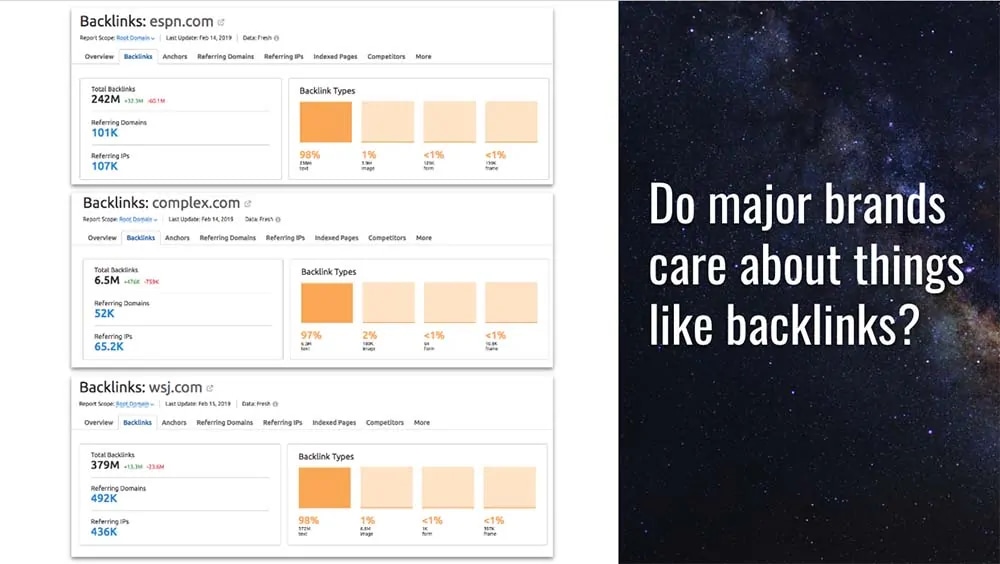
Carolyn: In general, I don’t stress about new backlinks. But what I do look at are backlinks that are not being utilized or owned correctly.
If you have an old site and get a new site, but left 26 million backlinks at the old site because you did a 302 redirect instead of a 301, that’s 26 million backlinks that I would like to have.
Lariza: Backlinks are really important; I’m currently in the process of doing a small strategy behind backlinks, but it’s also very time consuming, unfortunately. In a perfect utopian world, there would be one person dedicated to backlinks. I know there are agencies you could hire that will help you with backlinks and people pay for backlinks —which I don’t suggest, but if you’re doing that, that’s up to you.
I think my main focus is suggesting content that will organically get those backlinks to the editorial team. Complex is known for music and pop culture, but even our sports content has some great publications linking to our sports articles, so I think creating content that will organically get those backlinks is my main focus.
Richard: I think we identify certain backlink that have produced a lot of traffic, but we don’t focus on backlinks like a medium or smaller sized site would. What I do as a part of my audit process is look for toxic backlinks from sites that aren’t necessarily okay. There have been a couple of situations where people are trying to replicate our site and that’s a big legal issue that our legal team deals with.
More about domain-authority, backlinks, and the impact they have on smaller website here.
How do you capitalize on Google’s use of rich data in SERPS?
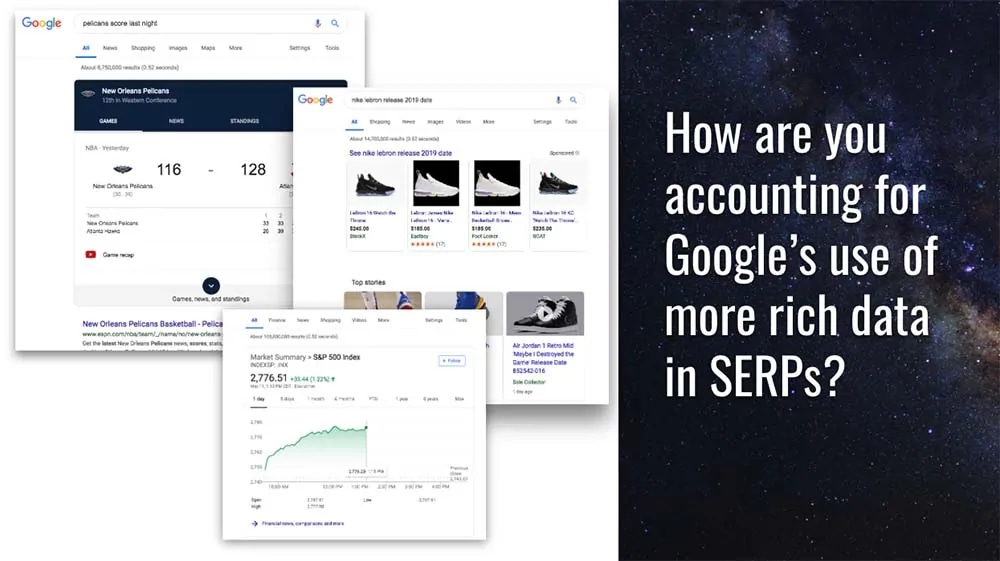
Carolyn: I may get in trouble for saying this, but basically, if Google wants the content, they’re going to take it. So, we should at least cooperate and make it easy for them to get what they want and then reference us.
But we’re very interested in it, keep an eye on it, and spend a lot of time making sure that we are popping up in those special features. Even if we’re the number one result, if we’re not in that special feature, there’s a perception that there’s less relevancy. So, maintaining that relevancy is really high in my priority list.
Lariza: I was really anti-zero results and I hope those don’t keep evolving. But in terms of all the other rich data, you, unfortunately, can’t fight it, and I think it’s important to make sure your markup is correct. Just because it validated correctly last year doesn’t mean it will validate this year, so staying on top of that is important.
What stands out to me are the answer boxes, feature snippets, and the ‘people also asked’ features; I think it really shapes your content road map. Instead of just writing to write, I think you really need to hone in on what your audience is searching for and what the answers they are looking for.
It’s my job to educate and be that SEO person for the editorial team that leads them and gives them advice on how we should structure our content so it does show up in these features.
Richard: We do focus a lot on schema data to make sure that it is structured correctly; if we release a new template for a new article type, that’s just part of the build. As a publisher, at the end of the day, I want them on my site and don’t want users to just zero click. It is definitely important to appear in carousels, and as long as the ads are pushed down, I’m all for it.
Rapid-fire questions to the SEO experts
Our moderator asked the panelists to give a thumbs up or thumbs down in response to emerging or popular SEO best practices in 2019. The idea was to determine how important these subjects were to SEO in the modern era.
Rich data or schema markup?
Unanimous yes. All panelist agreed, thumbs up.
Audio content?
Unanimous yes. All panelists believed audio content was a good thing.
Link-building?
Lariza: No
Carolyn and Richard: Maybe
More long-form content?
Lariza: Maybe. The reason for my in-between is because Complex does have important long-form content that we do every year, such as ‘Best Rappers Alive’; it’s a list that’s really important to the company and it is really really long. We’re trying to create a strategy to keep that format but still do it in a way that is user-friendly, especially on mobile; nobody wants to be scrolling through a bunch of pages.
Carolyn: Maybe. I just don’t like it when people write to make things long that don’t need to be. If I can answer the question in 300 words, then I answer the question in 300 words. No one wants to read a 10-page dissertation on how to bake a potato.
Richard: No; you need to write the appropriate amount it takes, but it doesn’t need to be an essay.
Improving internal link structure?
Unanimous yes. All panelists believe that publishers should be improving their internal link structure.
AMP?
Unanimous yes. All panelists agreed.
PWAs?
Unanimous yes. All panelists agreed PWAs were a good idea for the future.
Richard: If you go on your phones now and have a look at wsj.com, you will see that our mobile web homepage and article pages are rendered specifically. The home page is completely re-engineered; it loads as a PWA and it’s more like our app, and we have seen a significant lift after publishing it.
Artificial intelligence and digital publishing?
Richard: Yes. We actually have a lab dedicated to doing that in the newsroom that I work with and I love what they do, I think it’s great. The key thing is it does require human interaction, so it isn’t just something that’s going to replace jobs.
Carolyn: No. I was thinking more specifically of how there are some hyperlocal efforts to just completely automate the creation and writing of news, and I find that uncomfortable. You can’t you can’t have machines writing news; they can write a stub maybe.
Lariza: No.
Read more about A.I. in publishing here.
Audience Questions: What metrics do you focus on for your site’s for user experience?
Richard: Pagespeed. It’s not just mobile; I will bounce off a site or a page if it’s not loading on my desktop. I’m a bouncer.
Carolyn: For me, pagespeed, but everyone else, probably recirculation.
Lariza: PageSpeed. I think now with mobile-first index, the priority should be your mobile experience, but pagespeed metrics is the biggest priority.

That final audience question concluded the SEO panel about best practices for digital publishers in 2019. Tyler then thanked all the panelists for joining and mentioned that it was likely that they would expand opportunities like this for publishers to attend events where they could ask questions publically about these kinds of topics in the future.
What are your thoughts? Did this panel touch on the SEO best practices you’re most concerned about in 2019? What topics were left out that you wished they had touched on.
Tyler or one of the panelists may be able to provide answers if you leave questions or thoughts below.

